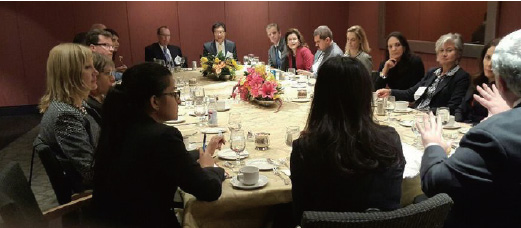

On the invitation of the World Bank
Group (WBG), I visited its headquarters
in Washington D.C. to attend the “Investment
Policy Forum 2016” on Nov.1. In
particular, I participated in the high-level
panel discussions that enabled various
investment stakeholders to gain a deeper
understanding of key issues. These
include the political economy of regulatory
conduct affecting retention and expansion
of FDI and the systemic investment
response mechanisms enabling a more
coordinated and timely response of governments
in addressing issues arising
from investors.
Within this context, I had the opportunity
to present on Korea’s Ombudsman
system and share the recent major operational
reforms that the Office of the
Foreign Investment Ombudsman (OFIO)
has gone through since its founding in
1999. Specifically, our office has recently
shifted our grievance-collection system
from ‘passive call-waiting’ to ‘proactive
outreach’. Previously, nine “home doctors”
used to await emergency calls
regarding foreign investor grievances
from foreign-invested companies in
Korea. But home doctors have rarely
received calls since then. Even if they did
receive the call, it was too late to respond
properly. To prevent this from occurring,
we now proactively reach out to companies
to listen to their complaints and
problems. Under the leadership of the
Ombudsman, we go out in small groups
and prescribe solutions on-site after carefully
listening to business-related challenges.
Another operational reform is that we
have organized a new senior advisory
group comprising of renowned scholars,
retired professors and retired high-ranking
government officials. These days, foreign
companies with more advanced
technologies suffer from grievances due
to the complexity of the issues involved.
For the same laws and decrees, different
government agencies have different interpretations.
Consequently they have to pay
heavy taxes and fines. When things get
worse, they wrap up their business and
leave the host country. To avoid such
unfortunate events, we utilize the high
level of expertise of senior advisers. By
effectively leveraging their professional
inputs, we can resolve the grievances at
relatively smaller expenses.
The purpose of the forum was to maximize
the investment potential of international
trade and investment agreements.
The World Bank is keen on the flow of
FDI as it believes that this brings substantial
benefits to the world economy and
particularly to the economies of developing
countries. The benefits to the host
country include easier access to world
markets, transfer of capital, technology
and managerial skills. To realize the maximum
benefit of FDI, the World Bank
believes that foreign investment should
not only stay in the host country but
should also be expanded. To make this
task possible for their client countries,
namely developing countries, the Bank is
trying to design a coherent investment
policy and promotion strategy that can be
adopted by their client governments.
According to the Bank’s observations,
many developing countries attract foreign-
invested companies but many of
them also leave the host countries for two
reasons: they realize that the various
incentives promised by the host governments
no longer exist or there is no place
to go when they encounter unexpected
problems and difficulties except through
an expensive court process. But the Bank
people say that Korea is exceptionally
different, as the country has the
Ombudsman system which provides necessary
services for foreign investors. As
such, the World Bank has ranked Korea
as the fifth easiest place to do business.
The forum came to an end by reviewing
the result of the Bank’s recent
research on the failures of FDI in developing
countries. The research team points
out that macroeconomic instability and
political risks are two principal factors
that would make foreign investors leave
the host countries.
Due to many factors taking place both
inside and outside the country, Korea
should take heed of potential risks that
might undermine its macroeconomic stability
and political landscape. If Korea
isn’t ready to preemptively manage such
risks, the country could end up facing
another economic recession, most notably
in the field of FDI. Therefore, the country
should pay close attention and manage
such risks to prevent any issues from
emerging in the future.